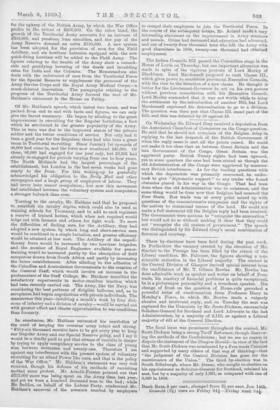In conclusion, Mr. Haldane reiterated his eoneictiole of the need
of keeping the overseas army intact and strong. "Fifty-six thousand recruits have to be got every year to keep our Regular Army and Our Special Reserve going, and I say it would be a deadly peril to put that stream of recruits in danger by trying to apply conipulsory service to the class of young filen between seventeen and twenty-one. Therefore I am against any interference with the present system of voluntary tecrititing for an island Power like ours, and that is the policy of the War Office." Mr. Haldane's statement was very well reeeived, though his defence of his methods of recruiting excited some protest. Mr. Arnold-Forster pointed out that £275,000 more was being spent on the Army than last year, and yet we were a hundred thousand men to the bad; while Ms. Seddon, on behalf of the Labour Party, condemned. Mr. Haldane's approval of the pressure exerted by employers to compel their employees to join the Territorial Force. In the course of the subsequent debate, Mr. Acland made a very interesting statement on the improvement in Army manners and morals. Crime had decreased and education had advanced, and out of twenty-four thousand tnen who left the Army with good eharaieters in 1908, twenty-one thousand had obtained employment.














































 Previous page
Previous page